"The river is everywhere at the same time..." — Hermann Hesse, “Siddhartha”
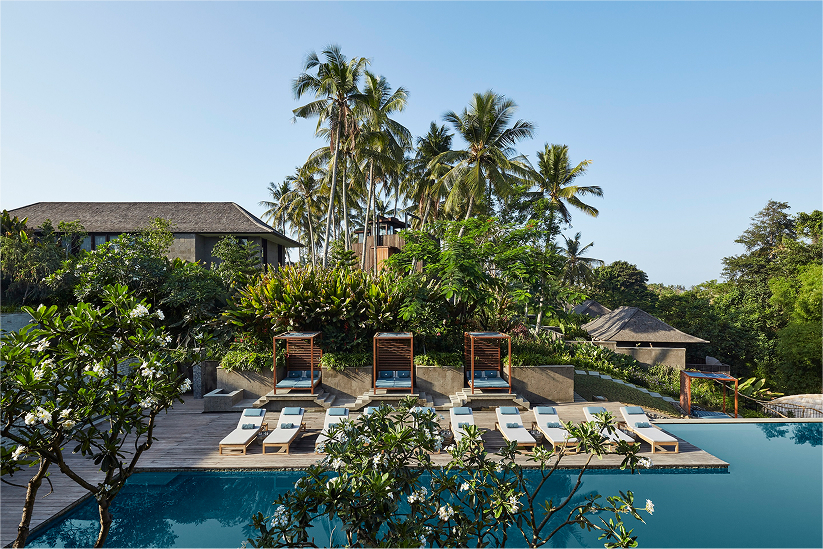
The first revelation comes with sound rather than sight. Before I glimpse the architecture, before my eyes adjust to the play of sunlight filtering through tropical canopy, it's the gentle symphony of cascading water that welcomes me to Nirjhara. This constant, soothing dialogue between river and stone announces itself as both background and protagonist in the narrative I'm about to enter - a story written in the language of natural elements rather than human ambition.
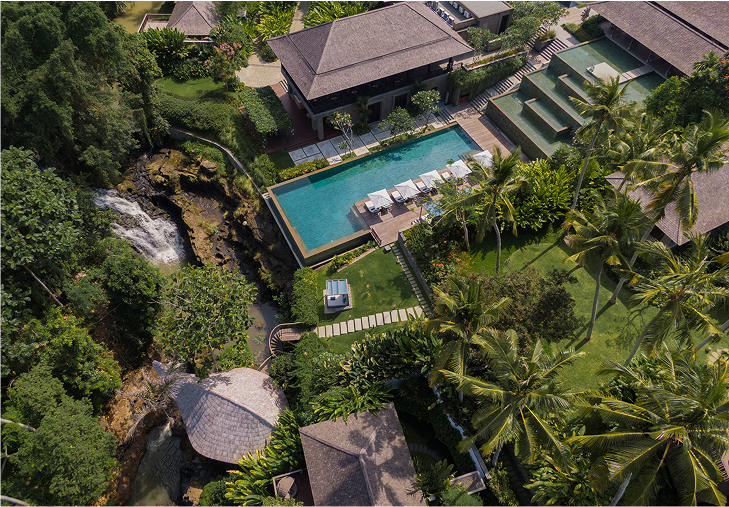
Arriving at this secluded sanctuary in Tabanan, Bali's unspoiled southwestern coast, feels like discovering a secret text on luxury that few have had the privilege to read. The name "Nirjhara," Sanskrit for "waterfall," isn't merely poetic nomenclature but the essential truth of this place: everything here flows, connects, transforms. Minutes from the iconic Tanah Lot Temple and the surf beaches of Kedungu, the resort occupies that rare geographical sweet spot - secluded enough to create its own universe while remaining connected to Bali's cultural pulse.
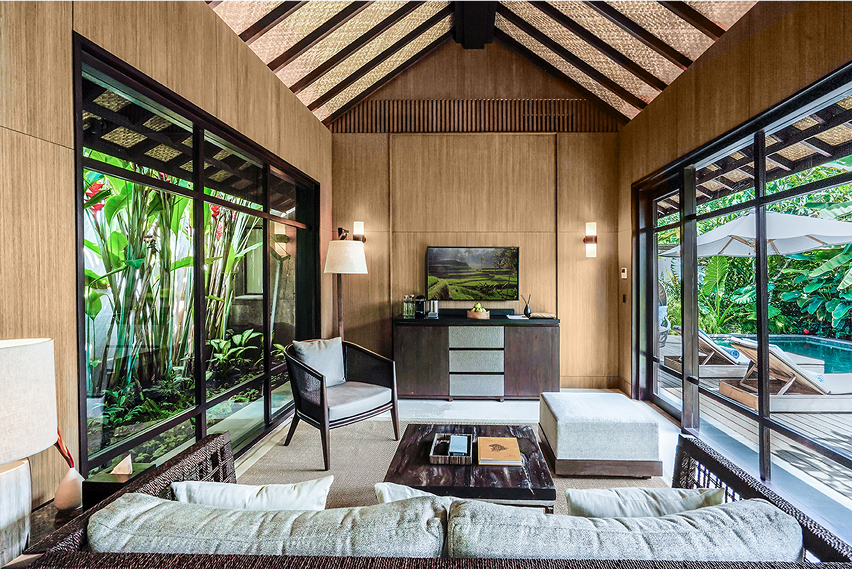
My villa, Number 12, presents itself not as a mere accommodation but as a thesis on how humans might better commune with their environment. Standing on the private terrace, watching the river weave its eternal path below the waterfall, I understand this is architecture as conversation rather than conquest. Warm hevea wood reclaimed from old buildings forms the foundation, traditional Sirap roofing provides shelter, and floor-to-ceiling windows dissolve the boundary between interior elegance and external wildness. Earth tones dominate the space, punctuated by thoughtfully curated Indonesian artworks that feel less like decorative afterthoughts and more like necessary cultural punctuation.
I ease into the outdoor bathtub as twilight approaches. The water temperature matches the cooling air perfectly. This isn't performative luxury; it's the quiet, meaningful kind that serves a deeper purpose. Without the distraction of plastic amenities (the resort maintains a zero-plastic policy, using only locally sourced natural products), nothing competes with the rhythmic murmur of the river. The sound envelops me completely. I find myself wondering if this is what true luxury has always been about - not excess, but the ability to listen undisturbed to nature's ancient language.
Later, I explore other accommodation options and discover the Canopy Suites - elevated treehouse-style sanctuaries that seem to float among the treetops. Each suite offers a private rooftop deck overlooking emerald rice paddies, creating the illusion of sleeping amid Bali's agricultural tapestry rather than simply observing it. These aren't mere rooms; they're intimate observation posts from which to witness the choreography between human cultivation and natural abundance.
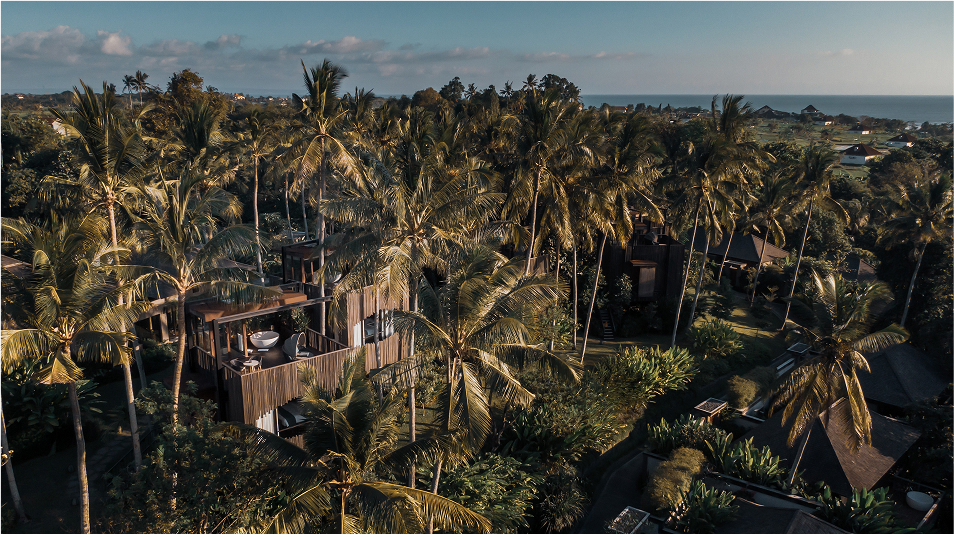
Morning arrives with light filtering through bamboo, transforming my room into a cathedral of natural illumination. Breakfast on the terrace of Ambu Restaurant reveals the resort's culinary philosophy: health-oriented without austerity, fresh without pretension. A delicate banana flower salad, freshly picked papaya, and house-made coconut yogurt infused with vanilla from nearby farms arrive not as mere sustenance but as a color study in Bali's natural palette. Each bite tells a story of proximity. I learn that 95% of ingredients come from either the on-site organic garden or trusted local farms, creating a gastronomic radius measured in meters rather than miles.

It's during the cooking class later that day that Nirjhara's holistic approach to Balinese culture reveals itself most clearly. The resort's chef doesn't merely demonstrate techniques; he narrates cultural context, explaining how each spice mixture reflects Indonesia's complex historical dialogue between indigenous traditions and foreign influences. We create rather than merely consume, grinding fresh turmeric and galangal on stone mortars, the aromatic oils releasing into the air like olfactory memories. The subsequent mixology session with local arak and tropical fruits continues this sensory education, transforming ingredients into narrative.
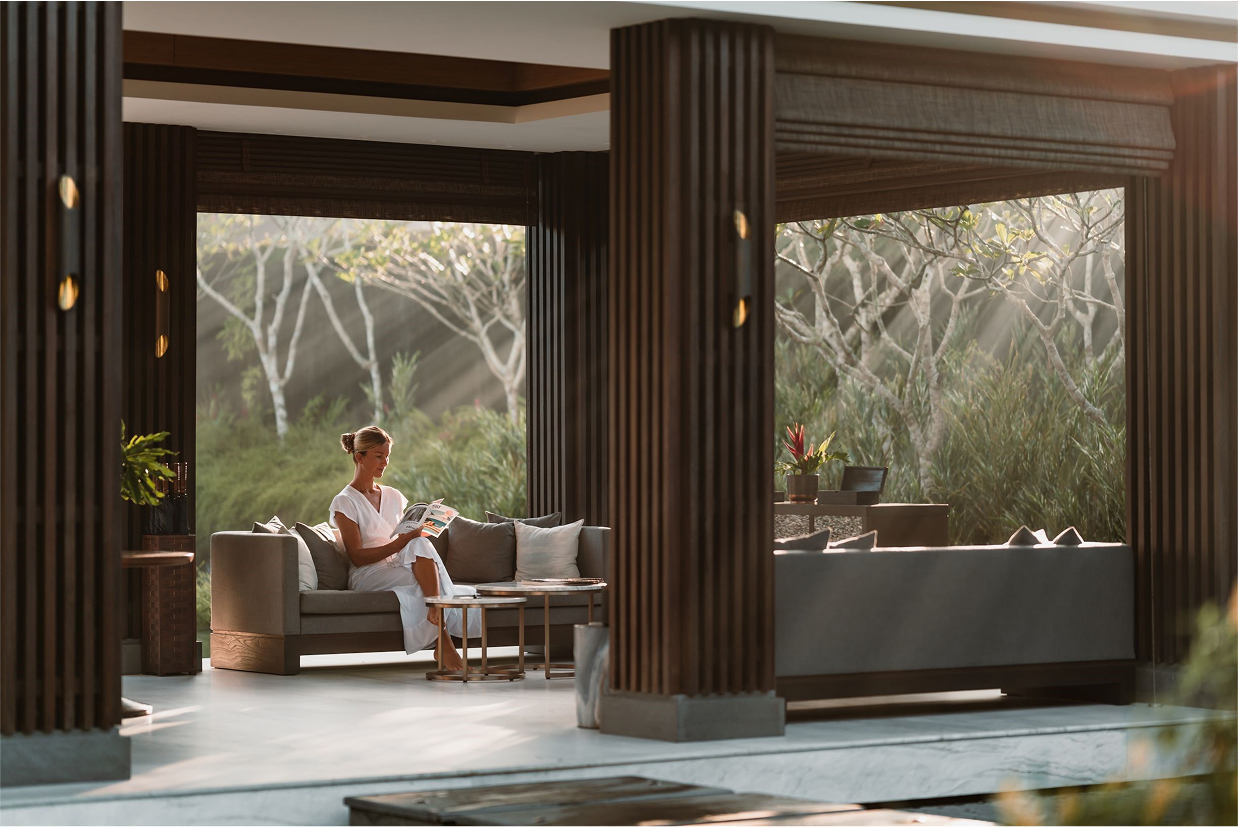
The following morning, I surrender to the expertise of Puspita at The Retreat, Nirjhara's wellness sanctuary. Her hot stone massage isn't a procedural treatment but a quiet conversation between practiced hands and receptive body. Where other therapists might follow a template, Puspita works with intuitive precision, lingering at the exact intersections of tension her fingers discover. Warm volcanic stones trace the pathways along my back, their weight and heat penetrating deeper than mere pressure could achieve. She incorporates traditional Balinese thumb work with contemporary techniques in a seamless choreography. The treatment room's floor-to-ceiling windows frame the reflection pool outside, creating the impression that the boundary between water and sky, between tension and release, is more permeable than we typically allow ourselves to believe.
Later, as afternoon mellows into evening, I join a Yin Yoga session in the bamboo Shala overlooking the waterfall. Designed by renowned Ibuku architects, this open-air pavilion appears to grow organically from the landscape rather than impose upon it. Our instructor speaks softly about finding edges without forcing boundaries - a philosophy that seems embedded in Nirjhara's very foundations. Each pose is held in contemplative stillness while the waterfall provides nature's own sound healing, its white noise clearing mental pathways as effectively as any guided meditation.
The sense of care extends beyond wellness into every human interaction. General Manager Alejandro moves through the property with the attentive grace of someone hosting friends in a beloved home rather than managing a resort. Staff members remember preferences without ostentation, appear when needed and recede gracefully when privacy is preferred. During a movie screening in the private cinema, complete with artisanal snacks and handcrafted cocktails, I notice how the service embodies that most difficult of hospitality balances - professional without formality, attentive without intrusion.
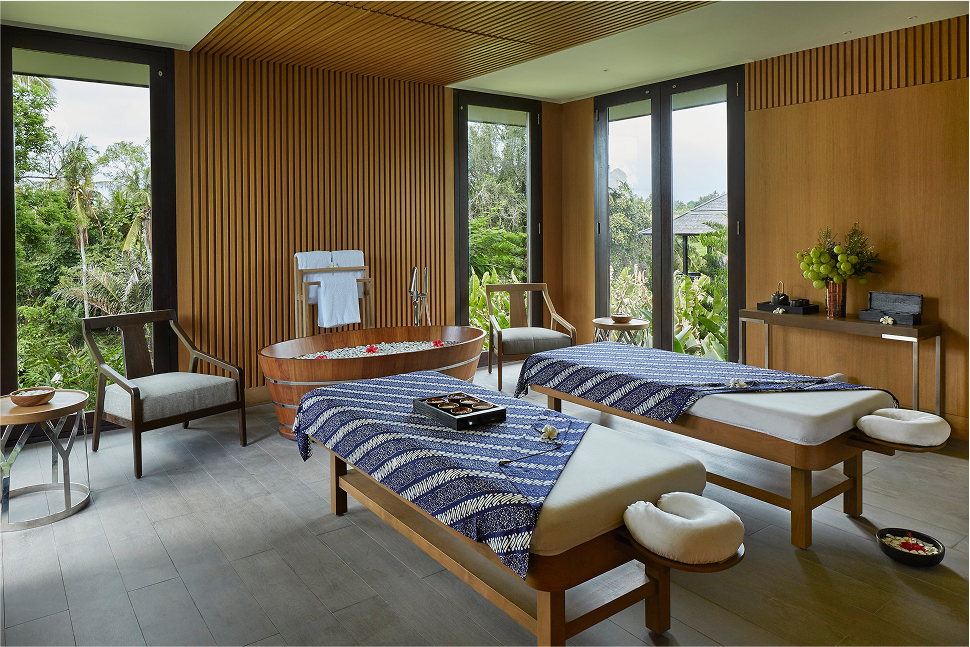
One morning, I joined a guided cycling tour that winds through rice fields, local villages, and eventually to Pigstone Beach. The excursion reveals Nirjhara's thoughtful relationship with its surroundings - we aren't tourists consuming photographic opportunities but temporary participants in Bali's living landscape. Our guide introduces us to farmers, explains irrigation systems that have functioned for centuries, and contextualizes the sacred geometry of temple architecture we encounter along the way. When we reach the volcanic black sand of the beach, the juxtaposition of jungle and ocean emphasizes Bali's remarkable ecological diversity, compressed into such navigable proximity.
For couples seeking deeper connection, the resort offers the Nyepi Sacred Blessing - a ritual that transcends typical spa offerings to create a genuinely transformative experience. Conducted in the tradition of Bali's Day of Silence, it combines meditation, sound healing, and traditional touch therapies into a ceremony of profound intimacy.
Before departing, I learn that Nirjhara's owners have extended their sustainable approach to maritime adventures with Vela - a 50-meter private charter yacht blending traditional phinisi craftsmanship with contemporary design. This floating extension of the Nirjhara philosophy sails custom itineraries through Indonesia's archipelagic splendor, from Raja Ampat to Komodo National Park, offering the same thoughtful luxury for those drawn to oceanic rather than riverine discovery.
As I prepare to leave, sitting in the library overlooking the main pool and waterfall lounge area, I realize what makes Nirjhara exceptional isn't any single element but the coherence of its vision. This isn't a resort that happens to be sustainable or happens to be luxurious; it's a place where these qualities emerge naturally from a deeper understanding of what meaningful hospitality entails. Unlike properties that trumpet their eco-credentials while missing the emotional essence of true sustainability, Nirjhara simply embodies better practices as the obvious choice rather than marketable virtue.
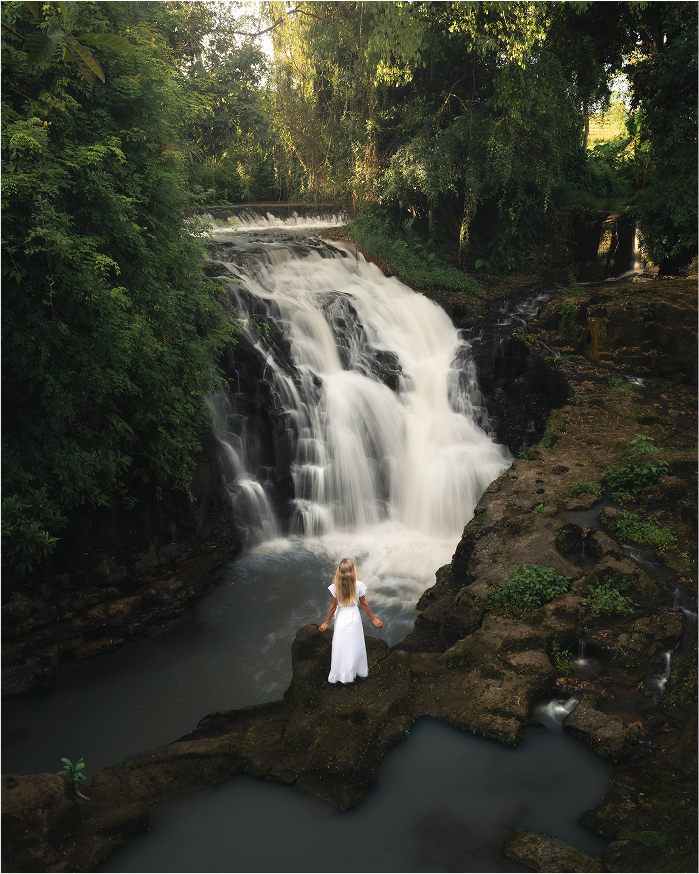
On my final evening, during meditation by the river, the waterfall's constant tumble seems to articulate what I've been feeling throughout my stay - that true luxury isn't static but eternally flowing, not accumulated but experienced in moments of perfect attention. As twilight deepens the shadows around me, I understand that I'll carry this sensory memory not as a souvenir but as a template for a more attentive way of moving through the world. Nirjhara hasn't just offered accommodation; it has demonstrated a different rhythm of existence - one that honors natural cadences over artificial urgencies, meaningful connections over superficial indulgences.
This is Bali at its most profound - not as photogenic backdrop but as living teacher, with Nirjhara serving as eloquent translator of ancient wisdom through the language of contemporary hospitality. In a world increasingly defined by digital distraction and environmental disconnect, this waterfall-centered sanctuary offers something revolutionary in its simplicity: the luxury of coming home to our senses, to the earth, to ourselves.



